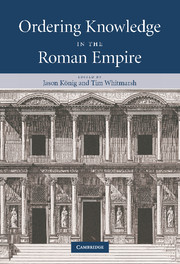Book contents
- Frontmatter
- Contents
- Preface
- Notes on contributors
- List of abbreviations
- Part I INTRODUCTION
- Part II KNOWLEDGE AND TEXTUAL ORDER
- 2 Fragmentation and coherence in Plutarch's Sympotic Questions
- 3 Galen and Athenaeus in the Hellenistic library
- 4 Guides to the wor(l)d
- 5 Petronius' lessons in learning – the hard way
- 6 Diogenes Laërtius, biographer of philosophy
- 7 The creation of Isidore's Etymologies or Origins
- Part III KNOWLEDGE AND SOCIAL ORDER
- Bibliography
- Index
6 - Diogenes Laërtius, biographer of philosophy
Published online by Cambridge University Press: 28 August 2009
- Frontmatter
- Contents
- Preface
- Notes on contributors
- List of abbreviations
- Part I INTRODUCTION
- Part II KNOWLEDGE AND TEXTUAL ORDER
- 2 Fragmentation and coherence in Plutarch's Sympotic Questions
- 3 Galen and Athenaeus in the Hellenistic library
- 4 Guides to the wor(l)d
- 5 Petronius' lessons in learning – the hard way
- 6 Diogenes Laërtius, biographer of philosophy
- 7 The creation of Isidore's Etymologies or Origins
- Part III KNOWLEDGE AND SOCIAL ORDER
- Bibliography
- Index
Summary
‘Tell them I've had a wonderful life.’
L. WittgensteinOne way to ‘organise knowledge’ is to write a history of a discipline or area of study, tracing its development from its origins to its present state. By choosing what to include and what to exclude the author of such a history delimits that area of knowledge and makes clear those figures or groups thought to have contributed to its development, and arranges them in a way which presents their relationship to one another as practitioners or inquirers into this area of study.
Philosophy, a notoriously difficult practice to define, attracts organisers and history-writers. Philosophers themselves have always been interested in the history of philosophy. That is not to say, of course, that they always agree about how one ought to be interested in the history of philosophy. Characteristically, they ask questions about the history of philosophy. First, should philosophy essentially be concerned with its own history? Is an awareness of the history of philosophy essential to one's being a philosopher and being engaged in thinking philosophically? (Some philosophers are interested in the history of philosophy only to the extent of actively dismissing it as relevant to what they do as philosophers). Secondly, what ought to count as the history of philosophy? Should the history of philosophy be narrowly conceived as the history of a certain agreed set of philosophical problems and how they have been addressed by a certain agreed set of philosophers?
- Type
- Chapter
- Information
- Ordering Knowledge in the Roman Empire , pp. 133 - 149Publisher: Cambridge University PressPrint publication year: 2007
- 18
- Cited by



